[第三季:第九十五集] S3E95 : 哈佛「快樂人生」研究,然後呢?
![[第三季:第九十五集] S3E95 : 哈佛「快樂人生」研究,然後呢?](https://www.podcastworld.io/podcast-images/xi-gu-kuai-le-shi-yan-shi-741y350s.webp)
Explore "ted talk" with insightful episodes like "[第三季:第九十五集] S3E95 : 哈佛「快樂人生」研究,然後呢?", "44. How to Give a TED Talk with Star Hansen", "Break the hurry habit: Carl Honore", "Allan Savory: Can we be wrong about the real reason for climate change?" and "40. Build a Bridge of Connection - Connect IN to Connect OUT" from podcasts like ""矽谷快樂實驗室", "Storytelling That Sticks for Business and Life", "The Dareful Project", "2 Vikings podcast" and "Storytelling That Sticks for Business and Life"" and more!
![[第三季:第九十五集] S3E95 : 哈佛「快樂人生」研究,然後呢?](https://www.podcastworld.io/podcast-images/xi-gu-kuai-le-shi-yan-shi-741y350s.webp)
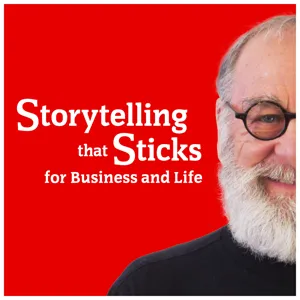
Star Hansen’s TEDx Talk has been viewed 255,000 times. Listen and learn how she came up with her Idea Worth Spreading and how she nailed her talk. She shares the intimate truth about what it was like for her to overcome her nerves, focus on her purpose and rise to the occasion.
A TED Talk is unlike any other speaking experience. It forces you to get clear about your WHY, what you have to say and how to craft your message into a condensed format.
A TED Talk can also be a springboard to greater opportunities to grow your brand and your business. What would a video with 255,000 views do for your business?
Watch this interview on You Tube as a video: https://youtu.be/ZJ-YikcHfog
View Star’s TEDx Talk video at: https://www.youtube.com/watch?v=qjzvH2wrpDg&t=149s
Contact Star Hansen at: https://starhansen.com/
Contact Doug Stevenson at: doug@dougstevenson.com
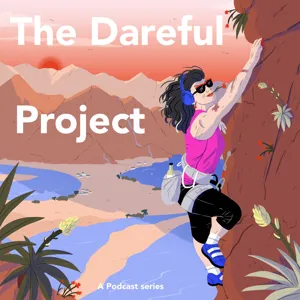
Carl Honoré is a journalist, author and TED speaker. He’s also the voice of the global Slow Movement. He has written a series of books on the topic of slowness, slow parenting, slow living and ageing, and he travels the world as a speaker, sharing how to thrive in a fast world. His TED Talks have millions of views.
Carl also has a new book coming out in the U.S., Slow Adventures: 40 real life journeys by boat, bike, foot and train. In this episode, we talk about why slow matters, his ah-ha moment reading a bedtime story to his son and practical steps we can all take today to live tempo giusto, the right speed.
Transcript:
Debra Hotaling (00:04):
Hello and welcome to the Dareful Project. I'm Debra Hotaling. Carl Honore is a renowned journalist, author and TED speaker. He's also the voice for the global slow movement. He's written several books on the topic of slowness, slow parenting, slow living and aging, and he travels the world as a speaker. In fact, his TED Talks have millions of views and he has a new book out. It's called Slow Adventures, 40 Real Life Journeys by Boat, bike, foot and Train.
Carl, welcome.
Carl Honore (00:39):
Thank you very much. It's great to be with you.
Debra (00:41):
So I first have to make a confession, real deal here, Carl. I super, super struggle with slow. I'm the person who's over caffeinated. I've actually had job reviews at the end of the year where they're like, you got to slow it down on those business phone calls. This is something that I really struggle with. Ground me on the basics.
Carl (01:10):
Well, you'll be relieved to hear as a fellow type A, that the slow revolution and the slow philosophy is not about doing everything slowly, which would just be an absolute nightmare for you, me and many other people in between. No, it's about doing things at the right speed. So musicians have a lovely term. They talk about the tempo giusto, the correct tempo for each piece of music, and that kind of gets at with the slow culture quake, the slow movement is all about, it's about choosing the right tempo for the moment. So sometimes yes, fast, sometimes you want to be in turbo mode, but other times it pays to slow down into tortoise mode, right? So really if you dig a little deeper into slow, it's a mindset, it's a mentality. It's quality over quantity, it's being present and in the moment, it's doing one thing at a time.
Carl (02:02):
Ultimately, slow with a capital S is about doing everything not as fast as possible, but as well as possible, which let's face it, it's a very simple idea. It's core, but it's also at the same time, an immensely powerful one because it has the capacity to revolutionize in a good way, everything you do. So that's why in every field of human endeavor now, you will find a slow movement, people coming to the party saying, how can I do this thing better and enjoy it more by slowing down to the right speed? So you mentioned in the intro there are slow travel, slow parenting, there are slow food, slow management, slow art, slow fashion, slow medicine, you name it. People can do it better by finding the right pace. And very often that means these days in our fast forward world, it means taking it down at notch or two and slowing down to find that correct tempo.
Debra (02:52):
Now, you've been an advocate for this for a time, right? I believe your TED Talk on the slow movement was 2005?
Carl (03:03):
Yeah, my first book, the book in Praise of Slow or in Praise of Slowness in the US is 2004. So we're actually a couple of weeks away from the 20th anniversary. So I've been on this track for some time.
Debra (03:14):
Congratulations. And tell us, what have you seen over the course of since 2004 when you started talking about this?
Carl (03:24):
Well, it's a mixed bag. On one side, the keynote of modern society remains acceleration, and in some ways we have got faster. So when I first floated the idea of a slow movement back in 2004, we didn't even have the iPhone then. We didn't have social media. And since then we've added artificial intelligence. I mean, there's been a real cranking up of pace and speed in many ways. But the good news is that in parallel, the countercurrent for slow has also grown fast as it happens. So when I first began talking about this idea, could we talk about slow as a creed, a philosophy that could reshape everything we do? You looked around the world at that point there was slow foods, slow cities, there wasn't much more. Now, like I said a moment ago, they were slow. Everything, and people at all stages of life are waking up to the folly of doing everything faster.
Carl (04:21):
So yes, on one hand the hallmark of modern society remains speed, but the countercurrent is stronger and stronger all the time. And I think actually the pandemic gave a real boost to the slow movement because what was the pandemic for many of us, if not a global workshop in slowness, right? It basically just stopped the world. And I didn't like, it was funny actually, when the pandemic hit, so many people wrote to me and said, you must be so happy, right? Everybody's been forced to slow down. I was like, no, I'm not happy at all. The pandemic is a total nightmare for all of us in so many ways, but like many nightmares, I think it brought a little silver lining, and it was the fact that we got a taste. Many of us got a taste of what it would be like to live without FOMO, to live without overstuffed schedules, to live with more time for baking, for playing with our children, for going for a walk with our partner, for doing all the slow stuff that gives life texture, meaning color, transcendence.
Carl (05:20):
And so that's why you see now the pandemic, well hopefully is receding into the past. People are coming out of that moment, that extraordinary moment in human history and making deep tectonic changes in their lives. So they're coming out and saying, you know what? I am leaving that bad relationship, or I'm changing careers, or I'm moving from the city to the country, the country to the city, or I'm learning a new, I'm making a big change. Because they had time finally, for the first time ever to slow down, pause, reflect, and grapple with big questions like, who am I? What's my purpose here? Am I living the right life for me? Because when you get stuck and fast forward, very often you find yourself living in autopilot. You're just following someone else's script. And for many people, the pandemic was a wake up call. It was a moment to say, okay, I'm slowing down here. I'm looking at the terrain. I'm joining the dots. I'm contemplating the horizon of the big picture. And I realized that I was just racing through my life instead of living it. So I've seen since the pandemic hit a real ratchet up of the slow movement.
Debra (06:18):
Well, that totally makes sense because it's hard to do this. Just wake up one morning and go, okay, I'm going to be slow today. It really is going to take maybe a job loss or losing a partner or loved one or an illness scare, right? Something's going to really shake your world.
Carl (06:36):
Absolutely. And for me, my wake up call came all those years ago when I started reading bedtime stories to my son. And honestly, back in those days, I just couldn't slow down. So I'd go into his bedroom at the end of the day, sit on his bed with one foot on the floor and speed read Snow White. So they're skipping paragraphs lines. I became an expert of what I called multiple page turn technique, which was you'd try to see three more pages, but it never works, right? I mean, our kids know these stories inside out. So my son would always catch me. He'd say, daddy, why Snow White? Why are there only three dwarves in the story that I knew what happened to Grumpy? And I realized that this was just almost an obscene approach to story reading. But I couldn't stop. I was so fast.
Carl (07:22):
I had to get through it as fast as possible. I couldn't. And then my wake up call came when I caught myself flirting with a book I heard about called The One Minute Bedtime Story. I remember that. I was, hallelujah, man, Amazon Drone delivery. I need that book right now. But then it was the light bulb over the head, second thought, and I just thought, no, what? No, this can't be true. Am I really prepared to fob off my son with a soundbite instead of a story at the end? And that was the moment of genuine searing epiphany. It was like an out-of-body experience. I suddenly saw myself there in sharp Relief, and what I saw was, oh, it was ugly, it was unedifying, it was just wrong. And I thought, nah, I cannot carry on at this pace because something has to give. Something is already giving. And that for me was hitting rock bottom, and that was my wake up call.
Debra (08:18):
You talk a lot about parenting, and I want to talk about grandparenting too, because our kids are really overscheduled. They feel our stress and their own stress in their lives. And you have a terrific book that is out in the UK and Europe and other parts of the world and will be available in the US next May, and it's called Slow Adventures, 40 Real Life Journeys by Boat, bike, foot and Train. And this feels like a super cool opportunity to do what you're just talking about here. It makes you, the transportation makes you slow down. If you're sitting in a train, you're going to have a conversation with your little human instead of sort of, we got to be here. We got to be there. What prompted you to write that book?
Carl (09:10):
Well, I know from my own personal experience that travel has often been, especially with my own family growing up as a child and now my family with my own children, that the moments I found it easiest and maybe even some ways most rewarding to slow down were when we traveled. So when we would go somewhere as a family, whether it would be to another city or to the countries, wherever we went, there was something about the pace and the rhythm and the tempo that just shifted. We just sort of shifted into a lower gear. And so I always had on my radar the idea to write something about, specifically about slow travel. If you look at the broader slow movement, the slow travel movement is one of the most vigorous strands of that movement, and it's one that I find personally the most appealing. And then along came the pandemic, which I travel for work all the time, and I love doing that.
Carl (10:01):
But that was one thing that went out the window. Suddenly I couldn't travel anywhere, and I felt the loss of that. So those two things collided my desire to write something about slow travel families and children with my own itch to get back out of my home and into the world again. And I thought, well, the best way to do that would be through a children's book. I'd never written one before. I've read obviously many of them, some of 'em I sped read, but then I got better and started reading them properly. I ditched the multiple page turn technique, and I don't recommend that to any parent. I hate to do add here. And so I thought, well, I'll write a children's book. And it was such a joy as well, because it meant that every day when I couldn't leave my home, I could travel the world in my imagination, reading, revisiting my own journals, watching other people's video blogs.
Carl (10:52):
And so just getting a sense of what was going on before rewriting about it and revisiting places. So it's like I could travel the world on a magic carpet of words, and it was such a joy to write, and it's a thrill to have it out in the world now and hear from parents and families all over the world. And the way they often talk about it, they pull the book out and they say, now where are we going to go tonight? And will we go by bike or will we go on foot? Or maybe tonight's a boat night or it's a train and are we going to go to South America or maybe Asia and stuff. And I just feel like it opens up the world, and when you open up the world, you open up people's hearts and their minds and their imagination, and that's the greatest gift we can give to our children, isn't it?
Debra (11:34):
Okay. Take us on an adventure. Where could we go? What's your favorite?
Carl (11:40):
Oh gosh. Like the old, well, who's your favorite child question, isn't it? One of my favorite ones, and I've redone it recently, is walking the Appian Way outside Rome, the ancient walkway that goes back 2000 years, that goes out of Rome all the way to the coast. I think it goes to NDIA on the coast, and it's still paved with the ancient Roman paving stones, and it's lined by old mausoleums and arenas where gladiators once fought in palaces and so on. And it's just, I mean, talk about a trip down memory lane. You wouldn't want to rush that, and you just walk, you soak up the landscape. And I went most recently with my wife who'd never been on the Appian way before, and it was a joy, and I've not done that one with my children. My children now are grown. They're adults themselves.
Carl (12:39):
They can do the Appian Way on their own. But it did make me think, wouldn't it be nice to do an Appian way walk with a family even now? But I would've loved to have done that with my children when they were smaller because they loved Romans like so many kids. I remember loving Romans, Roman Empire and all that stuff, whether it's asterisk or stuff that's a bit more historically accurate, but to be able to go and walk along Appian way and imagine yourself into the following, in the footsteps of sandal clad Roman centurions or traitors coming to Rome to hawk their wares. And so it just makes the heart sing.
Debra (13:19):
I love that. And as I'm thinking of you and maybe your children when they were tinier, if you did that traveling with children or grandchildren, it makes you be slow because they have their tiny little legs and their intense curiosity, and you find that you have a completely different adventure now you're looking at the cats that are there instead of going and checking out all the history, there's something lovely about children that makes us slow down if we pay attention to it, right?
Carl (13:50):
Utterly, utterly. And this is one of the greatest gifts that children offer us is slowness. Because let's face it, no child is born in a hurry. That just doesn't happen. They don't even understand how time works. You say to a three-year-old, you have four minutes and they'll look at you like you've just stepped in for another dimension. It's just meaningless to them, right? Children are artists of the moment, they're masters of now, and we've all been that in that moment, walking down the street with your seven-year-old, and she spots a lady bug and a Rose Bush, and she could stop there for 20 minutes, right? She'd give the ladybug a name, she'll weave a narrative of Icelandic saga proportions. If the ladybug flips off to another bush, she'll go chasing after it, doing cartwheels, getting exercise. And we actually know that in that moment of unhurried, tactile play and exploration in the world, your daughter's brain in that moment is on fire.
Carl (14:44):
She's building her brain and wastes a thousand hours of tutoring and a million educational DVDs are never going to touch. The trouble is that we are also pumped up and professionalized as parents that we see that ladybug moment and think that kind of looks like a waste of time. You pull her away from the ladybug and say, hurry up, we're late for ballet. And there was something about the magic of the ladybug moment that children are so good at, right? And if we would just pause, take a deep breath and slow down to their rhythm as parents or grandparents, we could tap into that magic and that majesty that children are so all children are so good at, right? And I think travel is a really good time to do that because as you say, they've got the little legs. They don't have the energy to keep going all day long, full tilt.
Carl (15:28):
If we kind of just rather than trying to drive them faster, if we went down a notch or a gear or two to their rhythm, then everything opens up. And when you slow down when you're traveling, any journey can become a bomb for the soul and a banquet for the senses. You can do that walking the Appian way, but you can get the same payoff, the same delightful kaleidoscopic experience of the world in all its richness, just walking to the end of your street or walking to the playground in your park. It's about turning on all five senses and having them fully illuminated and giving them the time and attention they deserve. And that's there for everyone. It doesn't cost anything. Sure, you can spend a lot of money and go to Rome. You can slow travel in your backyard, especially if you've got a child to take you along as a guide.
Debra (16:21):
It's true. I remember my parents are going to laugh, but one of the nicest travel moments was our car broke down and we were staying at a cabin in the desert, and so we had to stay for a few more days while the car got fixed. And I'm sure the grownups were just beside themselves trying to figure out the car getting fixed. But I had the best time because there was nothing to do. It was so fun.
Carl (16:46):
Oh, that's so telling, isn't it? That the fact that there was nothing to do, no. FOMO is such a relief and such a joy. That's such an indictment of the way we live our lives now, isn't it? And you heard that as well. Whenever there's a big power cut in a city, people look back fondly. I remember I live in London here in England, and a few years back, it actually snowed. I mean really properly snowed and London's totally not set up for it. So the city just round to a halt, no planes, no nothing, three days of, and people still talk about it 12 years later they were, you remember that snowstorm? And we all stayed home and we walked up to the park and we threw snow. Their faces light up. And you think that didn't cost anyone anything. It was just that people slowed down. They only slowed down. But why wait for that? Why not just do it ourselves? It's right there for everybody. It's true for the taking.
Debra (17:45):
It's true. And the reason I invited you, and I'm so glad that we're talking today, is your book really sparked something in me. I'm going to be a grandparent next year. And I hadn't really thought hard about what that meant, but I realized there is a profound opportunity as a grandparent to give the gift of slow. And I think of the relationship with my grandparents, and the thing I remember most about them and that I love deeply, is that they were the people who would just get on the ground and color with me or chalk, and they didn't have to worry about work or that they had something else to do. They would just hang out with me and go do, I don't know. It was just magical.
Carl (18:35):
It is. It's a kind of superpower. And interestingly, I mean, my most recent workup and looking a lot at aging and how aging affects us and how we feel about aging and how we can age better, and one thing they found when they do studies on people moving through the long arc of life is that we tend generally to get better at being in the moment. We get better in that second half of our lives at shutting out the sound and fury of this swirling around us in the modern world and just being there, right, being present, just what you've described there, the grandparent getting down in their hands and knees and playing Lego for an hour and not getting bored. I've seen that in my own life. I don't have grandchildren yet. I hope to. Not too soon. I'm quite enjoying the empty nest stage at the moment, but hopefully there's some grandchildren in my near-ish future. I remember with my own father. My own father was quite fast and busy and always working and so on. And then when he became a grandparent, he just seemed like it was a total 180 degree transformation. My son particularly was really given to delivering very long stories that I thought, oh, this is great. A lot, great creativity. But sometimes I'd be thinking, oh man, how much longer is this going? Whereas my father would sit there in the front room in the living room, he'd be there for an hour and a half just listening to all it, and there's no way my father would've done that as a father, but as a grandfather, he brought that to the party, and I thought that's a real testament to what grandparents can do. And there's a funny, I sort of feel like it's like an arc where grandparents and grandchildren kind of meet around in a circle. If you go all the way around the circle, I still feel like there's something, there's a natural complicity between grandparents and grandchildren that is eternal and glorious.
Debra (20:27):
Oh, complicity. That is the word. It is. I also love how you were surprised by your father's behavior. I mean, it really affects not just the direct relationship that kind of infused your relationship as well.
Carl (20:46):
Yeah, it did actually, because that was all happening around the time that I was beginning to think, oh no, I'm just too fast, but what do I do? I am fast naturally. How do I stop? And then certainly seeing my own father adopting that grandfatherly slowness shook me in a good way. It made me think, oh, there are different ways of being in the world and people can change. So yeah, that was part of my own journey away from road runner Dom and Speedo. Holism you like.
Debra (21:20):
What has surprised you about your journey?
Carl (21:27):
I think the thing that surprised me most, and this I hope will be heartening for anyone listening who's worried about slowing down, is that my biggest fear was that I would guess it's FOMO. I thought if I slow down, a big part of slowing down is just by did to the math, right? You only have so many minutes a day that I was going to have to drop things and let them go, and I was going to miss those because I'm somebody who's got a real hugger for life, for taking a big bite out of the world and just enjoying what I'm doing, where I am, the people I'm with, and the prospect of, yes, okay, I knew I was going to gain a lot by slowing down and the things that I would do, I would really enjoy them more. I'd have more energy.
Carl (22:06):
I wouldn't be burned out from so many, such a long laundry list of upside. I kept thinking, oh no, but I'm going to have to swallow a lot of pain here because I'm, I'm giving up X, Y, and Z in order to. But I never felt that. It was amazing to me that right away, for me, one concrete example here, I love sports. I play a lot of sports and always have done. And I realized that I couldn't carry on playing all the sports I was playing. So I let tennis go, and I've loved tennis, but tennis takes a long time. It's not like squash say or something where you can play it in 50 minutes. Tennis is a good, and I thought, I'm really going to miss tennis. I never once missed it. I know I'll go back to it later on. I've actually thought about starting this next year, next summer.
Carl (22:54):
Now I've got more time as an empty nester to return to it. But it's funny. I thought, oh, I'm going to be in distress here. Having given stuff up, I wasn't. Why? Because at some point you realize that having it all is just a recipe for hurrying it all. And you're much better off doing a triage and just sitting back, taking the time and saying, what really lights me up here? What can I let go of? And once you let the stuff go, it's remarkably easy. The question was, what surprised me was the ease with which I let stuff go, and it didn't hurt. It caught me.
Debra (23:30):
Well, then maybe you've answered my question. What happens when you get overwhelmed? When you get unfocused, what do you do to get yourself on the right track?
Carl (23:54):
I've got a few little, I guess they're kind of fast tips for slow quick hacks, right?
Debra (24:01):
I see what you did there…
Carl (24:02)
The first one I do is this is something that's really straightforward: breathing. Because once you get into that kind of headless chicken, oh no, everything's moving, you're breathing very shallowly, and that becomes a self-fulfilling. You're in a loop then. So just to pause and take a few deep breaths, you're changing the physiological temperature of your body. You're recalibrating. You're finding a slower place to stand. And so just take a few deep breaths. If you're finding yourself getting whooped up into the kind of crazy hurly burly that can just infect all of us, that virus of hurry is coursing through people all around us. We can catch it. So breath, that's number one. Number two is, and this goes to a lot of very interesting research they've done showing that being in nature is also very calming, soothing and physically tranquil.
Carl (24:57):
It slows us down. So just spend time in nature. I don't mean you don't have to go do a nine hour hike in the Rockies. You can just walk across the street or go to the park or go into your back garden or even sit near a plant if that's all you've got. Just something about being near green spaces does make a difference. It does slow us down. People call it forest bathing or ecotherapy or green paws, whatever it is. But just try and build something of that into your day. Or if you're really feeling kind of uptight and wound too tightly, just get yourself into some green space for a little bit. So breathing green space. And then I think it also helps to have to hand an easy, I think if it's a kind of slow ritual that you can carry with you everywhere.
Carl (25:42):
So that could be, for some people it's craft. So it might be knitting, it could be reading. You have a little book, you read poetry or reading a novel, no screen, like a real book with pages and stuff. For me, often it's, and I'm really bad at this, is drawing or sketching, but I have a little sketchbook that I stop and look at things. This is something we never do nowadays, is stop and stare and really stare at something and then look again and look and then render the object or the person or whatever it is, in lines on a page. And that has an incredibly soothing effect on anyone and definitely on me. I mean, I feel I just get right into deep work, full focus, slow mode through drawing. And that could just be simply piece of paper and a pencil, right? Again, no cost. You can carry it around in your bag or your back pocket. It's always there. So those are three things. One little slow ritual, bit of green time, some breathing. Those are three things we can all carry around with us as ways to reconnect with our inner tortoise.
Debra (26:44):
Staring, I don't think we've talked enough about staring. That's a big idea.
Carl (26:52):
It is, isn't it? Because we don't really look at things these days. We glance, right, we scroll, we don't read, we scroll, we don't look, we glance, this is the fast forward culture that we're in. We're just skimming the surface of things. And there's so much to be gained from stopping and staring for actually looking, really looking at something. I've been doing some work with a new organization. It started in Spain called Empo. So time of art or art time. It's the slow art movement basically, is another way of thinking of it. And it's all about encouraging people to use art as a way to reconnect with themselves and the world and other people. But through slowness. Because if you look at studies at how much time people spend looking at the average work of art in a museum or a gallery, it's about 11 seconds, which isn't that much time if you're standing in front of a Picasso or a Rembrandt.
Carl (27:50):
And yet that's sort of the world we live in. But there's so much to be earned and gained by taking time to look, because not only do you come to understand and appreciate the thing you're looking at more, but you come to understand and appreciate yourself more. It becomes a self-fulfilling loop. There's something about the process of stopping, pausing, contemplating, trying to make sense of looking away, looking back, that it's like it generates and provokes and stimulates an internal monologue, which is also very important as well for finding out and pinpointing where we stand in the world, what's going wrong with our lives, what we can do next, and so on. So there's just so much to be gained from looking deeply. Looking slowly.
Debra (28:38):
Yeah, looking slowly. That makes sense. And you're reminding me, a few weeks ago I went up to, I live in Los Angeles, and the Getty has this terrific special exhibit about William Blake from the Tate Gallery. And so it's beautiful and it's complete, but William Blake will not let you just glance through it because it's tiny. And he has tiny, tiny text. And so you are forced. You just can't run through and go, oh, okay, saw that. You have to get there with the magnifying glass and you're going to be there for a time. And what you described was exactly the feeling. Plus there was this wonderful community of staring together as we were trying to figure out what was going on inside these incredibly intricate illustrations. And everyone had this sort of shared awe together as we were walking through. It was really remarkable.
Carl (29:42):
That's beautiful. And I love the word awe that you used there, because I think that is something else that slowness gives us access to is awe, awe and wonder. Those things don't happen if you're juggling five things at the same time with your eye on your phone. They just don't. They only happen when you show up fully and give yourself completely to the moment. And ideally, I think in many cases you do that with other people. There's a wonderful old quote or refrain saying that goes, if you want to go fast, go alone. If you want to go far, go together. And I think that's another reminder of what Slow is all about. It's people often first encounter the slow movement and think, okay, I'm going to slow down here. I'm going to get in touch with my inner tortoise. I'm going to do things at the Tempo Juto, the correct speed, and it's going to make me more productive, more creative, more happy, more healthy, all that good stuff.
Carl (30:38):
But that's not enough. You've got to take slow the next step, because really slow is about reconnecting us not only with ourselves, but with other people. And we'll only ever really genuinely slow down if we all do it together. Create a world where the pressure is not on to road runner your way through every moment, where only a few people can only sometimes slow down. No, that's just a bandaid on a deep whoop. I'm talking about something much more seismic here in the long run. And I think that we get there by doing it together. And that's one of the main benefits I think of slow, is it's deeper bonds and connection with other people. Because let's face it, you cannot accelerate human relations. You just can't. These things have a natural arc. You can't make someone fall in love with you faster because you want to get married in June. Yes. You can't forge a deep friendship because you need someone to backpack around Asia with you next week. You can't download team Spirit from Amazon. These things take time. And not just time, they take presence that people need to show up with full attention and listen and to look at the world in the way you described there, looking at Blake together and share their reactions. And that's how we create a society worthy of the name. That's how we come together to build a world that works for everyone.
Debra (32:04):
Amen. Alright, we have, I'm ready. Okay. This is going to be my day to day. I really appreciate the time that you took to walk us through Slow to wander through Slow. And I'm going to make sure that everyone has all of the links on our site, on our notes. And you can already go folks to Target and other bookstores. And you can pre-order Slow Adventures. It'll be out May of 20, 24, or if you're traveling to UK and other parts of the world, it's already out there. And what is the title in the UK?
Carl (32:43):
The title is, it's The Journey, not The Destination. It's exactly the same book, but just a different title.
Debra (32:51):
Cool. And we can use that and we can use that as a guide and we can check things off as we either do them or imagine them together.
Carl (33:00):
There you go. I know. It's so sweet when families write and say, well, we're using this as a sort of family planning trip guide, right? So next year we'll do this and maybe we'll do that and stuff. So yeah, it's been very, very lovely, that whole experience.
Debra (33:15):
Well, thank you. Thank you so much.
Carl (33:17):
Thank you. It's been a pleasure chatting.
Debra (33:19):
Thanks for listening to The Dareful Project. Please follow, like and leave a review. It really helps. We're on all your favorite platforms, Spotify, apple Podcasts, Google Podcasts, iHeartRadio, audible. Tune in Amazon Music, Stitcher, SoundCloud, and YouTube. And to connect, you can email me at debra@darefulone.com. That's Debra, D-E-B-R-A at Dareful one. That's with the number one.com. Thanks for listening.
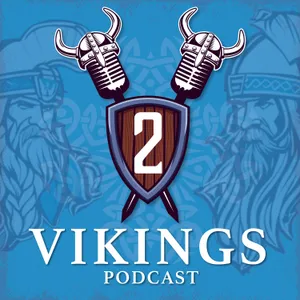

There is an invisible space that exists between you and your audience. To succeed, you need to build a bridge of connection and invite them to cross over to your side of the bridge. You need to be so engaging, congruent, and connected to your power, that they find you and your stories irresistible. Rather than reaching out to connect with them, they reach out to connect with you.
But what happens when your insecurity invades that space and widens the gap? In this episode, you’ll learn how to Connect IN to your power, in order to Connect OUT to your audience.
Contact: doug@dougstevenson.com
Tucson, Arizona

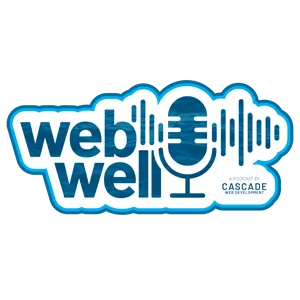
In this enlightening episode of the Web Well Podcast, we have the privilege of talking with Cathey Armillas.
Join us as we explore Cathey's fascinating journey from a high school psychology class to becoming a powerhouse in marketing and a renowned speaking coach. Cathey shares her unique insights on how a fundamental interest in human psychology led her to a career in marketing and eventually to coaching people in the art of impactful speaking. We also get a peek into her personal life, from her early days in sports to her current passion for pickleball.
Cathey's story is a testament to the unexpected twists and turns life can take and how embracing these changes can lead to a fulfilling career and life. You can tune in for an episode filled with inspiring stories, practical advice, and a fresh perspective on speaking and marketing.
Learn more about Cathey at www.catheyarmillas.com or search for her on Social Media.... she's the only Cathey Armillas (with an "e")!
Follow us wherever you listen to podcasts!! We'd also love to hear what you think... please share your questions and comments with webwell@cascadewebdev.com
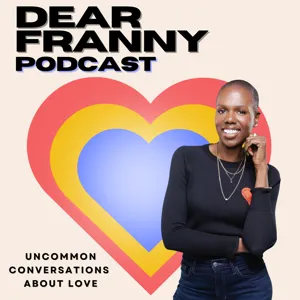
The wait is over! Franny’s TED talk about a world where everyone has true love is finally live! In this episode, she talks about manifesting this talk, as well as how, by embracing love holistically, we can make true love inevitable.
WATCH Franny’s talk at: https://go.ted.com/francescahogi
***Franny’s 21-Day course, How to Date With Intention is 50% off for a limited time! Get your copy HERE.***
Keep in touch!
Join Franny’s free community for single women, The True Love Society, by clicking HERE.
@dearfranny on Instagram
@dearfrannypodcast on Instagram
@dearfranny on Twitter
@dearfranny on Clubhouse
@dearfranny on TikTok
Francesca’s Website
Credits:
Edited and produced by Bex Carlos
Cover art photography by Matt Romansanta
Cover art graphic design by Francesca Hogi
Theme music by Origamibeats
Episode graphics and show notes by Francesca Hogi
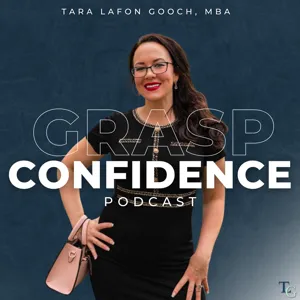
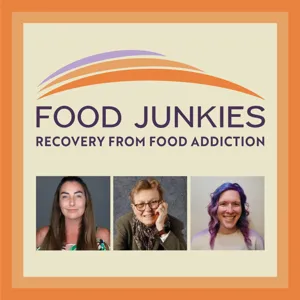
Our guest today is Dr. Lisa Feldman Barrett. Lisa is among the top 0.1% most cited scientists in the world for her revolutionary research in psychology and neuroscience. She is a University Distinguished Professor of Psychology at Northeastern University. She also holds appointments at Harvard Medical School and Massachusetts General Hospital, where she is Chief Science Officer for the Center for Law, Brain & Behavior.
In addition to the books Seven and a Half Lessons About the Brain and How Emotions are Made, Dr. Barrett has published over 275 peer-reviewed, scientific papers appearing in Science, Nature Neuroscience, and other top journals in psychology and cognitive neuroscience, as well as six academic volumes published by Guilford Press. She writes regularly about science in the popular press, including The New York Times, The Guardian, Scientific American, BBC Science Focus, Time magazine and more.
She also has a popular TED talk, which we have linked in her bio, that has been viewed over 6.5 million times.
Dr. Barrett received a National Institutes of Health Director’s Pioneer Award for her revolutionary research on emotion in the brain. These highly competitive, multimillion dollar awards are given to scientists of exceptional creativity who are expected to transform biomedical and behavioral research.
Among her many accomplishments, Dr. Barrett has testified before Congress, presented her research to the FBI, consulted to the National Cancer Institute, and been a featured guest on public television and podcast and radio programs worldwide. She recently did a 2 hour podcast with Andrew Huberman which is definitely worth checking out!
She was president of the Association for Psychological Science in 2019–2020 and co-founded the Society for Affective Science. She is also an elected fellow of the American Academy of Arts & Sciences and the Royal Society of Canada.
Todays Topics:
Her personal/professional story.
How she became THE person who would teach the world how emotions are REALLY made.
How emotions are made (they aren’t simply triggered reactions).
She walks us through an instance of emotion (sadness, anxiety).
Her thoughts on adverse childhood experiences/trauma and disordered eating
How metabolic functioning effects everything and why we need to be aware when we are doing things that are metabolically expensive (uncertainty, neural processing).
How people predict and experience pain
It’s not our thoughts that create feelings but feelings that create our thoughts.
How our brain writes a story that makes predictions about what will happen and this becomes our reality.
Can we teach our brains to make different predictions?
How emotion concepts are taught to us by our parents
Actionable tools listeners can use to manage their body budget.
What is next for her?
If she could tell a younger version of yourself something about emotions, what she would tell herself?
Follow Lisa:
Ted Talk: https://lisafeldmanbarrett.com/multimedia/
Books: https://lisafeldmanbarrett.com/books/
Website: https://lisafeldmanbarrett.com
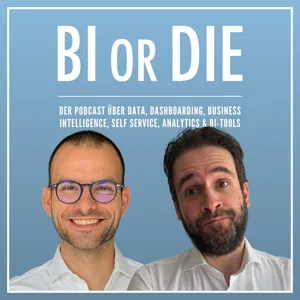
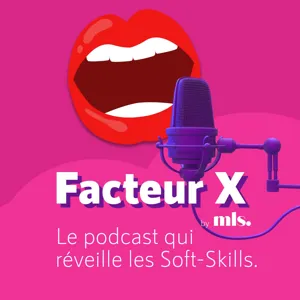
Si vous m’écoutez régulièrement, c’est que probablement vous cherchez à vous améliorer dans un domaine de votre vie, vous voulez progresser, et peut-être même que vous êtes à la quête d’un sens à donner à ce que vous faites. 👐
D'ailleurs, dans vos recherches vous êtes peut-être déjà tombé sur le TED Talk de Simon Sinek. C'est LE discours si vous cherchez de l’inspiration . Et il est tellement puissant que c'est l'un des plus vus de tous les temps ! ⚡
Donc, vous avez compris ... Si vous voulez être plus inspirant, si vous avez besoin d’embarquer des personnes autour de votre projet : cet épisode est fait pour vous ! On va décortiquer ensemble la méthode de Simon Sinek et découvrir votre POURQUOI !
Bonne écoute 🎧
❤️ Pour me suivre sur Linkedin : ici
🎙SOUTENEZ LE PODCAST
1. Abonnez-vous à Facteur X 🔔
2. Laissez un avis ⭐⭐⭐⭐⭐sur Apple Podcast ou Spotify
3. Mentionnez le Podcast ou moi sur les réseaux sociaux (ça me met toujours en joie)
LIENS 🔗
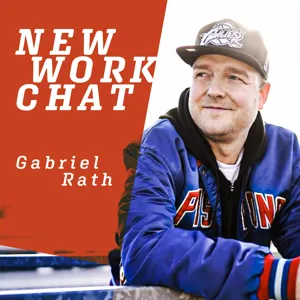
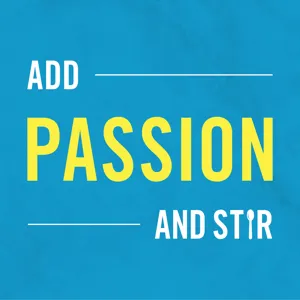
Dan Pallotta talks with us about the conversation he ignited with his 2013 TED Talk about the way nonprofit organizations are funded. “We want the nonprofit sector to solve huge problems. We want the nonprofit sector to be able to dream gigantic dreams,” he says.
However, there are still many problems with how nonprofits are evaluated and how people and other entities choose to fund them. “I would say that that conversation is where gay marriage was in… about 1945. We have a long way to go.”
Pallotta’s new feature-length documentary UnCharitable, featuring stories from figures like Edward Norton and Darren Walker, exposes the dark side of philanthropy with a call to action for a radical new way of giving.
See Privacy Policy at https://art19.com/privacy and California Privacy Notice at https://art19.com/privacy#do-not-sell-my-info.

In 1975, during the last days of the Vietnam War, Leann Thieman, a nurse in Iowa, volunteered to fly to Vietnam to rescue 300 orphan babies as the bombs were falling on Saigon. The story of that harrowing experience became the springboard for her to become a professional speaker. When someone agreed to pay her $100 to tell her story, she began her speaking career. She now charges $15,000 per speech.
In this interview, Leann shares with Doug the incremental steps she took in the first couple of years, to market and sell her speech. These steps are the basics of how to get started in the speaking business and get people to pay you to speak. If she can do it, you can do it.
Learn how to leveage your story into a lucractive speaking business.
Contact: doug@dougstevenson.com
http://www.storytelling-in-business.com
http://www.storytelling-in-business.com
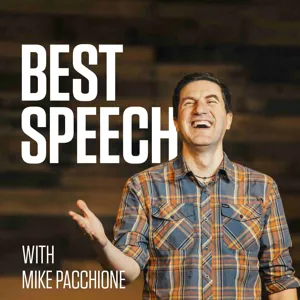
Mike and Jason walk through Jason's recent TED X talk called "Don't Say Divorce" from its inspiration as a viral moment to its presentation, complete with technical challenges. Watch his viral moment, his 18-minute TEDX talk, and his 38-minute version on his podcast at DontSayDivorce.com.
Jason Duncan is a renowned entrepreneur, author, speaker and podcaster. He shares his wealth of knowledge and experience through his Mastermind and coaching programs, his internationally-syndicated podcast, and his book, Exit Without Exiting.
Mike Pacchione is a public speaking coach and public speaker who can be booked at BestSpeech.co or directly at mike@miketalks.co. He's starting a new group coach soon, with only a few seats left.

Pattern stories are fun to craft and even more fun to tell. They’re like a good Whodunit mystery novel where the plot unfolds over time. They are constructed with a series of mini-stories or segments that illustrate how the same problem keeps happening over and over, while the person or organization experiencing the problem fails to learn the lesson. In the end, the pattern is recognized, and the lesson learned.
If you’ve ever made the same mistake multiple times or experienced a similar recurring problem in your life or career, you have a pattern story in the making. In this episode, learn how to identify and craft your pattern story.
For your free no obligation 20-minute coaching call, contact deborah@dougstevenson.com
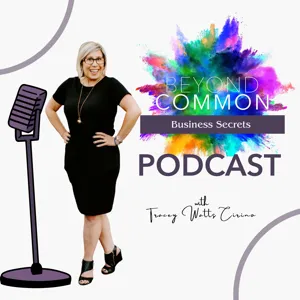
In this episode of Beyond Common Business Secrets, we welcome Erin McCahill and dive into a discussion about her recent TED talk. Erin is a corporate leader, entrepreneur, personal and professional culture creator, and #1 international best-selling author. As a sales and customer experience leader in the telecom, technology, and financial industry, her diverse background has led to a successful career and has built a strong reputation in building new and revitalizing low-performing organizations, that deliver exceptional results while providing a superior customer experience. Erin has received numerous awards in recognition of her success and possesses a Bachelor of Science in business management and an MBA. Finding the passion that drives her: helping others build personal and professional cultures, Erin is determined to share the lessons “the undercurrents of life” she has learned to make an impact in the world and give others hope and inspire them to live the life they desire. This talk was given at a TEDx event using the TED conference format but independently organized by a local community. Learn more at https://www.ted.com/tedx
To learn more about how to work with Erin go to https://themccahillgroup.com/
Here’s to creating a business and building a life that lights you up so that you can truly
Are you ready to say goodbye to fear, frustration, and overwhelm when it comes to growing and scaling your business? You’re in the right place. Welcome to Beyond Common Business Secrets Podcast I’m your host, Tracey Watts Cirino
Save your Spot Today!
https://www.beyondcommoncoaching.com/magneticmarketingplayground
Get your FREE Guide
7 Ways to Dream Big
https://www.beyondcommonbusinesssecrets.com/7waystodreambig
Time Mastery for Female CEOs: Unlocking Your Path to Freedom
💎 Enroll in the CEO Powercode Today!
Check out time-saving Technology
Fg Funnels Software
Do you have any kids' birthdays coming up?
Give the Gift of Creating Precious Cuddle Moments For Years To Come 🤗 with
The Winter Owl Experience Box
thewinterowl.com/experience
You can achieve BEYOND Common Success in your life and business...
1. Earn a BEYOND Common Income, Lead a BEYOND Common Team, and Live a BEYOND Common life... Enroll in the BEYOND Common Essentials Course today!
2. Get the books Beyond Common 12 Essentials for Success in Life and the Workplace book.
3. Hire Tracey to speak at your next big event support@traceywattscirino.com
Let's Connect on Social...
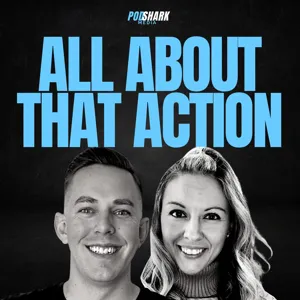
In today's episode, we're joined by the internet's favorite wordsmith, Joshua Lisec. Known for his ability to find "the best way to say it," Joshua has created waves across platforms, from TED to TMZ, Twitter Trends and beyond. With a whopping portfolio of over 80 nonfiction books under his belt, he has made a significant impact by crafting authentic voices for celebrities, executives, and industry novices looking to establish their authority.
As the world's only Certified Professional Ghostwriter and Certified Hypnotist, Joshua has an unparalleled understanding of persuasive communication. His influence extends further into the realm of education, with more than 2,800 students benefiting from his persuasive writing courses. Prepare to enter a world where words wield power, and every story holds the potential for profound influence.
Connect with Joshua:
Instagram: https://instagram.com/joshualisec
Facebook: https://www.facebook.com/entrepreneurswordsmith
Website: https://lisecghostwriting.com/
Don't forget to check out our other FREE resources!
⚡️ ️Join our FREE private Facebook Group
⚡️ Launch My Podcast: An Online Course
#businesstips #entrepreneur #digitalmarketing #launchmypodcast #podcastagency
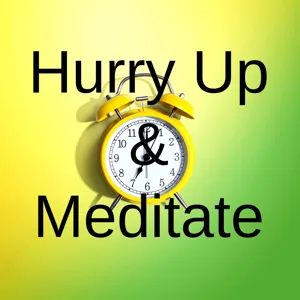
In today’s episode, Tim Ferriss shares a quote and his exercise for putting your fear under a microscope.
Remember, conquering fear is a gradual process, and regular meditation practice can help you build resilience and face your fears with greater ease over time. Be patient and compassionate with yourself as you embark on this journey of inner growth.
Have no fear, it’s time for your next episode of Hurry Up And Meditate!
Stay up to date
For any inquiries, please email us at hello@podcastworld.io